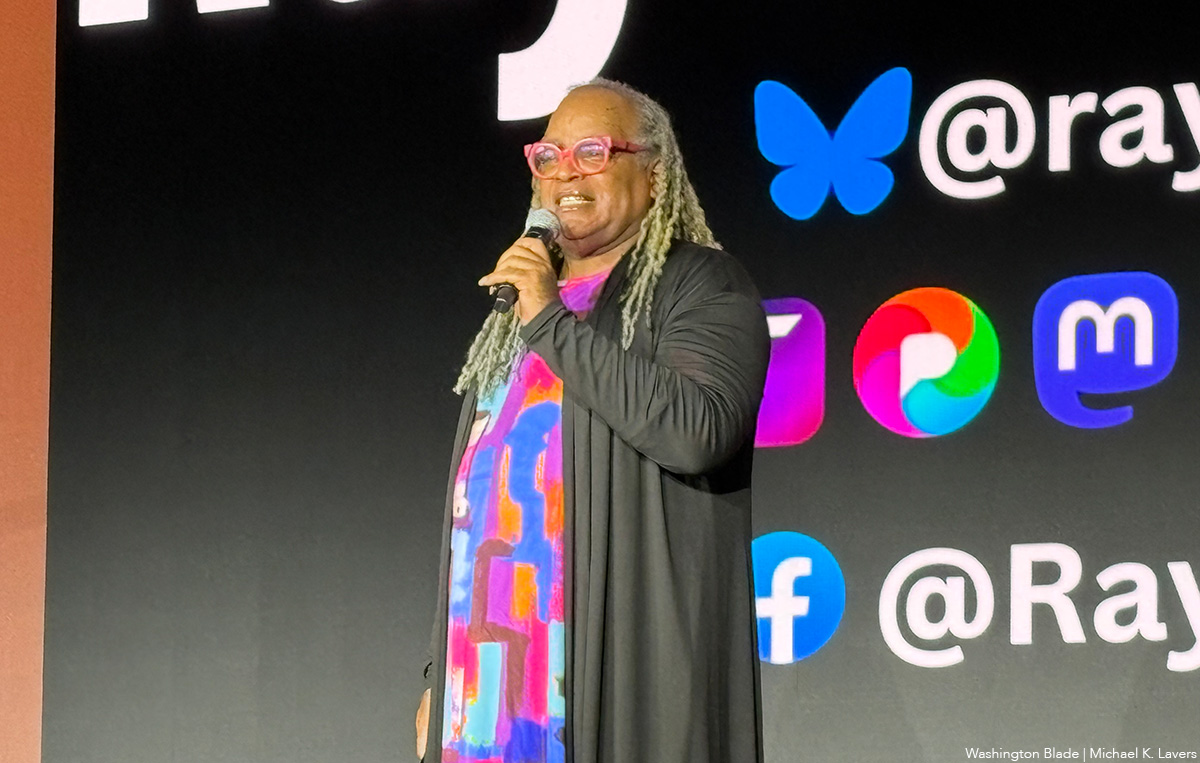Local
Opposing attorneys spar as Wone trial begins
Prosecutors say case ‘not about sexual orientation’

Opposing attorneys in the complex Robert Wone murder conspiracy trial clashed during opening arguments Monday over whether the defendants’ sexual orientation prompted authorities to prosecute them.
Assistant U.S. Attorney Glenn Kirschner said the government would point to the fact that Joseph Price, 39, Victor Zaborsky, 44, and Dylan Ward, 39, were in a three-way relationship as a means of showing that their “strong bond” played a role in their alleged conspiracy to obstruct justice.
Wone, a Washington attorney, was found stabbed to death in a guest room in the men’s Dupont Circle area townhouse in August 2006. The defendants, all of whom are gay, have been indicted on charges of obstruction of justice, conspiracy to obstruct justice, and evidence tampering in connection with the police investigation of the murder. No one has been charged with the murder.
The men face a maximum sentence of 38 years in prison if found guilty on all three charges.
“This case is not about sexual orientation,” Kirschner told D.C. Superior Court Judge Lynn Leibovitz, who is poised to decide the men’s fate after the prosecution and defense attorneys opted to forego a jury trial.
“This case is not about the personal relationship of these three. There is nothing negative that can be inferred due to the sexual orientation or the lifestyle choices of these men,” he said.
But he noted that Price, Zaborsky and Ward “had powerful bonds among them,” which amounted to a “tight knit family” that is protecting its members from the harm that would come to them “if the truth came out.”
Kirschner then spent more than an hour outlining the government’s contention that the men tampered with the crime scene, repeatedly misled police and homicide detectives investigating the murder, and know but refuse to disclose the identity of the person or people who fatally stabbed Wone three times in the chest.
He reiterated the government’s assertion in numerous briefs and a police affidavit that the evidence refutes the defendants’ claim that an intruder killed Wone after entering the house from a rear door while they were asleep in their bedrooms.
Among other things, Kirschner noted that paramedics and crime scene investigators found far less blood on the bed where Wone was found with three “gaping” stab wounds and found no signs of a struggle or defensive wounds. He said this is evidence of crime scene tampering.
Defense attorneys representing the three gay men countered that the evidence doesn’t support any of the government’s allegations, including an assertion that more blood should have been found on the scene. From the moment homicide detectives arrived at the house to investigate the murder, they became “marred and infatuated in a theory based on ignorance,” prompting them to suspect the men were involved in the murder, said Price’s attorney, Bernard Grimm.
“Why is a straight man coming to the house of a gay man,” Grimm quoted a detective as saying while interviewing one of the defendants.
Grimm said the defense would present expert witnesses to prove that one of the three stab wounds that pierced Wone’s heart would have rendered him dead within five seconds or less. Grimm said this, rather than a sinister conspiracy, was the reason there were no signs of a struggle and more blood did not flow from the wounds.
And he said there was “no orchestrating of the crime scene,” contesting the evidence tampering charge.
Ward’s defense attorney, David Schertler, said prosecutors were basing their case on “faulty assumptions, speculation and innuendo.”
Following the opening arguments, Wone’s wife, Katherine Wone, took the stand as the first government witnesses. In response to questions by Kirschner, she told how her husband met Price and recounted the friendship they shared as undergraduate students at the College of William & Mary in Virginia.
She said that her husband, whom Kirschner described as “exclusively straight,” arranged to spend the night at the home of Price, Zaborsky and Ward on the night of the murder because he planned to work late at his nearby office at Radio Free Asia, where he served as general counsel.
The trial, which is expected to last weeks, recessed shortly before 5 p.m. Monday. Katherine Wone was to return and complete her testimony Tuesday.
D.C. attorney Dale Edwin Sanders, who practices criminal law, said the part of the government’s case that appears the strongest is its assertion that no evidence exists to show an intruder entered the house to kill Wone. He noted that in cases based on circumstantial evidence, sometimes “missing” evidence becomes the key to the case.
In his opening arguments, Kirschner noted that an intruder would have had to scale a seven-foot security fence surrounding the back yard of the house, even if the rear door to the house was unlocked, as the defense says was likely.
He pointed to police findings that there were no footprints or other signs that someone jumped into the patio and grounds inside the fence. He said police findings also showed that dust, pollen and other debris on the top surface of the fence was “completely” undisturbed, indicating that an intruder did not go over the fence.
Additionally, Kirschner asked if an intruder entered the premises to burglarize the house, as suggested by the defense, why didn’t he take a host of valuable items in clear view, including a laptop computer, which were in his path en route to the guest room where Wone slept.
Schertler, however, disputed the arguments. Among other things, he said that an intruder could have bypassed the fence by using a nearby trash container to climb onto a shed next to the house where Price, Zaborsky and Ward lived, and jumped over the fence. He also noted that the prosecution could not determine the intruder’s “state of mind” as to why he did not steal anything in the house.
Local
Local LGBTQ groups, activists to commemorate Black History Month
Rayceen Pendarvis to moderate Dupont Underground panel on Sunday

LGBTQ groups in D.C. and elsewhere plan to use Black History Month as an opportunity to commemorate and celebrate Black lives and experiences.
Team Rayceen Productions has no specific events planned, but co-founder Rayceen Pendarvis will attend many functions around D.C. this month.
Pendarvis, a longtime voice in the LGBTQ community in D.C. will be moderating a panel at Dupont Underground on Sunday. The event, “Every (Body) Wants to Be a Showgirl,” will feature art from Black burlesque artists from around the country. Pendarvis on Feb. 23 will attend the showing of multimedia play at the Lincoln Theatre that commemorates the life of James Baldwin.
Equality Virginia plans to prioritize Black voices through a weekly online series, and community-based story telling. The online digital series will center Black LGBTQ voices, specifically trailblazers and activists, and contemporary Black queer and transgender people.
Narissa Rahaman, Equality Virginia’s executive director, stressed the importance of the Black queer community to the overall Pride movement, and said “Equality Virginia is proud to center those voices in our work this month and beyond.”
The Capital Pride Alliance, which hosts Pride events in D.C., has an alliance with the Center for Black Equity, which brings Black Pride to D.C. over Memorial Day weekend. The National LGBTQ Task Force has no specific Black History Month events planned, but plans to participate in online collaborations.
Cathy Renna, the Task Force’s director of communications, told the Washington Blade the organization remains committed to uplifting Black voices. “Our priority is keeping this at the forefront everyday,” she said.
The D.C. LGBTQ+ Community Center is also hosting a series of Black History Month events.
The D.C. Public Library earlier this year launched “Freedom and Resistance,” an exhibition that celebrates Black History Month and Martin Luther King Jr. It will remain on display until the middle of March at the Martin Luther King Jr. Memorial Library at 901 G St., N.W.
District of Columbia
U.S. Attorney’s Office drops hate crime charge in anti-gay assault
Case remains under investigation and ‘further charges’ could come

D.C. police announced on Feb. 9 that they had arrested two days earlier on Feb. 7 a Germantown, Md., man on a charge of simple assault with a hate crime designation after the man allegedly assaulted a gay man at 14th and Q Streets, N.W., while using “homophobic slurs.”
But D.C. Superior Court records show that prosecutors with the Office of the U.S. Attorney for D.C., which prosecutes D.C. violent crime cases, charged the arrested man only with simple assault without a hate crime designation.
In response to a request by the Washington Blade for the reason why the hate crime designation was dropped, a spokesperson for the U.S. Attorney’s office provided this response: “We continue to investigate this matter and make no mistake: should the evidence call for further charges, we will not hesitate to charge them.”
In a statement announcing the arrest in this case, D.C. police stated, “On Saturday, February 7, 2026, at approximately 7:45 p.m. the victim and suspect were in the 1500 block of 14th Street, Northwest. The suspect requested a ‘high five’ from the victim. The victim declined and continued walking,” the statement says.
“The suspect assaulted the victim and used homophobic slurs,” the police statement continues. “The suspect was apprehended by responding officers.”
It adds that 26-year-old Dean Edmundson of Germantown, Md. “was arrested and charged with Simple Assault (Hate/Bias).” The statement also adds, “A designation as a hate crime by MPD does not mean that prosecutors will prosecute it as a hate crime.”
Under D.C.’s Bias Related Crime Act of 1989, penalties for crimes motivated by prejudice against individuals based on race, religion, sexual orientation, gender identity, disability, and homelessness can be enhanced by a court upon conviction by one and a half times greater than the penalty of the underlying crime.
Prosecutors in the past both in D.C. and other states have said they sometimes decide not to include a hate crime designation in assault cases if they don’t think the evidence is sufficient to obtain a conviction by a jury. In some instances, prosecutors have said they were concerned that a skeptical jury might decide to find a defendant not guilty of the underlying assault charge if they did not believe a motive of hate was involved.
A more detailed arrest affidavit filed by D.C. police in Superior Court appears to support the charge of a hate crime designation.
“The victim stated that they refused to High-Five Defendant Edmondson, which, upon that happening, Defendant Edmondson started walking behind both the victim and witness, calling the victim, “bald, ugly, and gay,” the arrest affidavit states.
“The victim stated that upon being called that, Defendant Edmundson pushed the victim with both hands, shoving them, causing the victim to feel the force of the push,” the affidavit continues. “The victim stated that they felt offended and that they were also gay,” it says.
District of Columbia
Capital Pride wins anti-stalking order against local activist
Darren Pasha claims action is linked to his criticism of Pride organizers

A D.C. Superior Court judge on Feb. 6 partially approved an anti-stalking order against a local LGBTQ activist requested last October by the Capital Pride Alliance, the D.C.-based LGBTQ group that organizes the city’s annual Pride events.
The ruling by Judge Robert D. Okun requires former Capital Pride volunteer Darren Pasha to stay at least 100 feet away from Capital Pride’s staff, board members, and volunteers until the time of a follow up court hearing he scheduled for April 17.
In his ruling at the Feb. 6 hearing, which was virtual rather than held in-person at the courthouse, Okun said he had changed the distance that Capital Pride had requested for the stay-away, anti-stalking order from 200 yards to 100 feet. The court records show that the judge also denied a motion filed earlier by Pasha, who did not attend the hearing, to “quash” the Capital Pride civil case against him.
Pasha told the Washington Blade he suffered an injury and damaged his mobile phone by falling off his scooter on the city’s snow-covered streets that prevented him from calling in to join the Feb. 6 court hearing.
In his own court filings without retaining an attorney, Pasha has strongly denied the stalking related allegations against him by Capital Pride, saying “no credible or admissible evidence has been provided” to show he engaged in any wrongdoing.
The Capital Pride complaint initially filed in court on Oct. 27, 2025, includes an 18-page legal brief outlining its allegations against Pasha and an additional 167-page addendum of “supporting exhibits” that includes multiple statements by witnesses whose names are blacked out.
“Over the past year, Defendant Darren Pasha (“DSP”) has engaged in a sustained, and escalating course of conduct directed at CPA, including repeated and unwanted contact, harassment, intimidation, threats, manipulation, and coercive behavior targeting CPA staff, board members, volunteers, and affiliates,” the Capital Pride complaint states.
In his initial 16-page response to the complaint, Pasha says the Capital Pride complaint appears to be a form of retaliation against him for a dispute he has had with the organization and its then president, Ashley Smith, last year.
“It is evident that the document is replete with false, misleading, and unsubstantiated assertions,” he said of the complaint.
Smith, who has since resigned from his role as board president, did not respond to a request by the Blade for comment at the time the Capital Pride court complaint was filed against Pasha.
Capital Pride Executive Director Ryan Bos and the attorney representing the group in its legal action against Pasha, Nick Harrison, did not immediately respond to a Blade request for comment on the judge’s Feb. 6 ruling.

















